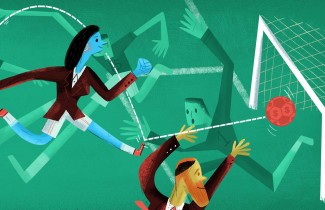The Dunning-Kruger Effect in Mexico
We would have better societies and leaders if we felt more comfortable saying “I don’t know”
When famed British philosopher Bertrand Russell was asked, in 1964, if he was prepared to die for his beliefs, he answered: “Certainly not, after all I may be wrong.”
Long gone are the times when people could defend a set of ideas--Russell was not only an intellectual, but also a well-known anti-nuclear weapons activist--while also acknowledging that they were only their best hypotheses of the world and life.
Since then, the world seems to have leapt into the arms of the “Dunning-Kruger effect”, named after Cornell University researchers Justin Kruger and David Dunning, who in 1999 published a well-known study. They found that people with low cognitive capacity tend to overestimate their own ability to carry out a task, and are also less likely to learn from their mistakes. And, on the contrary, individuals with a high cognitive capacity tend to underestimate their potential to successfully complete an activity. The result is a tragedy that every day harms business organizations and deteriorates political life, public opinion, and academia (students who need to study more are often those who least think so.)
“It is a well-known fact that people who most want to rule people are, ipso facto, those least suited to do it,” wrote Douglas Adams, author of The Hitchhiker’s Guide to the Galaxy, with typical black humor, in 1980. He was 19 years ahead of Kruger and Dunning.
Even though the connection of the Dunning-Kruger effect with many politicians is hard to ignore, I suspect that it also has quite a lot to say about the behavior of many people--in and outside Mexico--regarding the onslaught of COVID-19. Mexico City recently changed to amber in the epidemiological traffic light system, allowing several businesses to reopen in the city’s historical center, with warnings about adhering to social distancing and business owners serving just a few people at a time. It was of no use: the very next day, streets and shops were crowded, forcing the City Government to close the zone again. The same happened when beaches were reopened and even months ago on Mother’s Day.
“Entitled Mexicans”, as analyzed by Paz, are the most perfect offspring of Dunning-Kruger. Rules don’t apply to them, since their astuteness, talent, fearlessness or social connections place them above everyone else.
Members of the Dunning-Kruger Club aren’t aware of their membership. That is the paradox. And it is often well-meant: sometimes even the truly intelligent, by reason of this attribute, overestimate their ability to carry out a specific task, when one thing, without practice, does not necessarily lead to the other.
Even the world of advertising lives off Dunning-Kruger. When a footballer advertises toothpaste, or a soap-opera actress recommends a line of household appliances, do they actually know anything about these subjects? We are being taken in by a fallacy of authority by transfer: we assume that because someone is good at one thing, he or she will be knowledgeable about nutrition, orthopedics, finance or home technology.
At the risk of contradicting myself, I have to acknowledge that Dunning-Kruger could have a positive side. How many entrepreneurs have dared to launch a new project because they knew little enough to believe that they could be successful, ignoring the complexities of the industry?
Nevertheless, the most damaging effects of Dunning-Kruger eclipse the positive. We would have better societies and leaders if we felt more comfortable saying “I don’t know.” If people were more interested in pursuing data and, like Russell, working with hypotheses. No wonder it has been said that the best national responses to COVID-19 have been in countries led by women. The reasoning is that their administrations were humbler regarding ignorance of the behavior of the virus, more open to following the advice of scientists and more inclined to err on the side of caution, establishing strict quarantines and the mandatory use of face masks, while also communicating precise statistics.
No one can escape the Dunning-Kruger effect. However, there are counterweights that individuals and organizations can use: tackling every affirmation as a hypothesis to be proved, prototyping, humility, a culture that fosters debate and questioning (especially by employees of their bosses), and continuous data-driven calibration. In other words, a daily philosophy of optimization.
Article originally published in El Universal.



